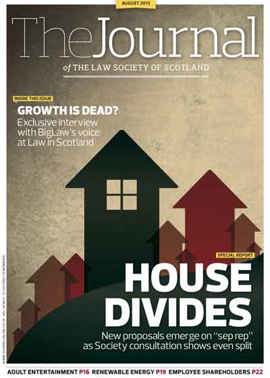A serious matter

Sentencing in rape cases
In HM Advocate v Cooperwhite [2013] HCJAC 88 (21 June 2013), the Crown unsuccessfully appealed against a sentence of six years’ imprisonment imposed in respect of two charges of rape.
The charges were separated by about eight years and the earlier one involved the appellant’s then wife. She had been raped while five months pregnant. She had been diagnosed with placenta praevia and warned by doctors that this condition made it dangerous to have intercourse. The complainer refused intercourse and was held down on one occasion and raped. She did not report the incident to the police at the time, but it was referred to in the pleadings when she petitioned for divorce shortly after. The appellant continued to have contact with the two children of the marriage, including the one born subsequently, and formed a relationship with another woman.
The new partner complained that on about four occasions she was raped when she had been sleeping. She would wake and find the appellant trying to have intercourse with her. She refused as she was tired with the demands of looking after her young child and training to join the police. Eventually she made a complaint and the earlier offence came to light. The appellant alleged any intercourse with the complainers had been consensual, but was convicted after trial.
The appeal court concluded that the sentence imposed was within the range for such offending. It was not possible to consider the potential danger to life of the unborn child in respect of the first charge, since this had not formed part of the libel.
Lord Justice Clerk Carloway, however, took the opportunity to review the law in respect of sentencing where rape had occurred during a relationship with the victim. In Ramage v HM Advocate 1999 SCCR 592 the appeal court had reduced a sentence of five years’ imprisonment to three and a half years, for an incident that occurred six years after a sexual relationship had ended. The couple had resumed contact but the victim had made it that clear sexual relations were not an option. Reference was also made to Petrie v HM Advocate 2012 JC 1, where the seven-year custodial element of an extended sentence was reduced to five years for an incident during an ongoing relationship.
Consideration was given to English sentencing guidelines, which established the principle that “sentencers should adopt the same starting point for relationship or acquaintance rape as for stranger rape”. This approach was noted to be radically different from that adopted in Ramage and Petrie, “which will require to be expressly addressed in any future consideration”.
Lord Eassie indicated reservations about issuing guidelines to judges in this area (see para 29), but Lord Bracadale concurred with the Lord Justice Clerk and it appears likely that in a future appeal in this context the court will expect full submissions on the practice in Commonwealth jurisdictions with a view to considering guidelines.
Guidelines: what scope?
It is interesting to note that despite the legislation for a Scottish Sentencing Council in part 1 of the Criminal Justice and Licensing (Scotland) Act 2010, there are no plans to establish such a body any time soon, due to the economic situation. In a smaller jurisdiction than England & Wales our appeal court lacks the caseload to hear a full range of appeals arising from the same type of offence and promulgate comprehensive guidelines. After a slow start, some guidelines have been laid down under s 197 of the Criminal Procedure (Scotland) Act 1995.
In some areas, notably death by reckless driving (HM Advocate v Noche [2011] HCJAC 108) and child pornography (HM Advocate v Graham [2010 HCJAC 50), the appeal court has piggybacked on English guidelines drawn up by their Sentencing Guidelines Council and approved by the Court of Appeal. In other cases important guidance has been given but buried away in an unreported opinion (e.g. Russell v Troup 2003 GWD 37-1033, which states that a longer disqualification is merited where the alcohol reading is well over the prescribed minimum).
Guidelines prepared in other jurisdictions are of value across a range of cases, and typically highlight in a matrix the aggravating and mitigating features that might arise, and indeed those tending to suggest a case is of medium gravity. Given the lack of opportunity for our appeal court to commission research into a type of offending, it is to be hoped that a number of cases can be gathered for consideration by the court if guidelines are to be issued in the future in this context.
No case: successful Crown appeals
On 15 July 2013, the appeal court reversed rulings of no case to answer made by trial judges in HM Advocate v Mair [2013] HCJAC 89, a murder case, and HM Advocate v Hutchison [2013] HCJAC 91, involving charges of rape and abduction.
Under changes brought into force in March 2011 by s 107A of the 1995 Act, the Crown can appeal acquittal decisions taken by the trial judge in solemn proceedings.
In each case the court listed the evidential elements brought out in the trials and held there was a sufficiency of evidence. It quashed the acquittals and directed the trials to continue.
These appeals require to be held at short notice so that the original juries can, if necessary, be regrouped and directed to consider verdicts at the conclusion of any further evidence.
Theft by finding
The appellants in Butler and Fraser v Procurator Fiscal, Aberdeen [2013] HCJAC 78 (11 June 2013) had been convicted of stealing copper wire. They had been found by police in a bin area near to their homes, stripping wire which they had found on a beach. There was no evidence suggesting the wire had been found near any business premises, which might be indicative of ownership. No evidence was adduced as to its value or condition. The appeal court was of the view that the possibility the wire had been abandoned in an act of fly-tipping could not be excluded, and the convictions were quashed.
Breach of the peace
Although the law of breach of the peace has settled down in recent years, aided to some extent by the introduction of the ubiquitous s 38(1) of the Criminal Justice and Licensing (Scotland) Act 2010, interesting cases continue to emerge.
In McGuinness v Procurator Fiscal, Alloa [2013] HCJAC 82 (11 July 2013) the appellant was convicted of a breach of the peace involving his wife. During the trial, evidence was admitted from the complainer of an assault on her by the appellant two days before the incident. She moved out and went to live with her mother, having contacted the police.
On the date of the alleged offence the complainer, her mother and her children drove back to her mother’s home. The appellant drove up and approached the other car. His wife was petrified after the earlier incident and locked herself in the car. The appellant knocked on the car window and asked to speak to her. When the complainer indicated she was calling the police the appellant left and sped off in his car.
The appeal court referred to the principles laid down in Smith v Donnelly 2002 JC 65; 2001 SCCR 800, Paterson v HM Advocate 2008 JC 327; 2008 SCCR 605, and Harris v HM Advocate 2010 JC 245; 2010 SCCR 15, and concluded that the appellant’s behaviour did not amount to a breach of the peace. The conduct had not been severe enough to cause alarm to ordinary people and threaten serious disturbance to the community. There had been no shouting or swearing, and the appellant had left after being told to go away. The incident was not protracted and did not escalate into a breach of the peace.
Football banning orders
In McGowan v HM Advocate [2013] HCJAC 75 (4 July 2013), after the appellant’s appeal against conviction was refused, the appeal court, from para 20 onwards, considered the sentence of 12 months’ imprisonment and five-year football banning order which had been imposed. The appellant, aged 20 at the time of the offence, had been part of a group of 20 Celtic casuals which had shouted, sworn and challenged Hearts supporters to fight after those away fans were leaving the ground having seen their team win.
Two co-accused had received longer sentences but had more significant criminal records. The appellant’s record was short and non-analogous. He had not previously received a custodial sentence. He had spent 19 days in custody before being granted interim liberation. He had not been in any further trouble since the incident, in 2009. He had a good work record and was in full time employment.
While the appeal court considered the circumstances merited a custodial sentence and a football banning order, the positive factors in the appellant’s case were such that the sentence was quashed and a 100-hour community service order substituted. The five-year football banning order, which was imposed with police reporting conditions designed to preclude attendance at foreign football games, was quashed and a two-year order imposed, precluding attendance at UK regulated matches and banning him from being near to Celtic Park on match days.
In this issue
- Widening access to the stocks and gallows?
- Family migration revisited
- The same but different
- Controlling tendency
- ESPC: out of the parental home
- Offshore employment: floating goalposts?
- Reading for pleasure
- Opinion column: David O'Hagan
- Book reviews
- Profile
- President's column
- Make the most of your "multiples"
- Sep rep: all to play for
- The bigger they are...
- Licensed to thrill
- Capacity challenge
- One year, and counting?
- Selling your rights... for what?
- The voice of technology
- A serious matter
- Relocation: where are we now?
- Whistle for reform
- Same sex marriage: for richer, for poorer
- Scottish Solicitors' Discipline Tribunal
- Residential property review takes shape
- In-house lawyers seek a rising star
- Mentoring: the way forward
- How not to win business: a guide for professionals
- Comm prop risks
- Ask Ash
- Crossed purposes
- Conference looks for profession to evolve
- Law reform roundup
- Help with the red flags






